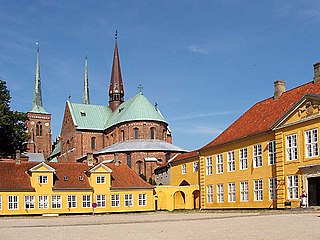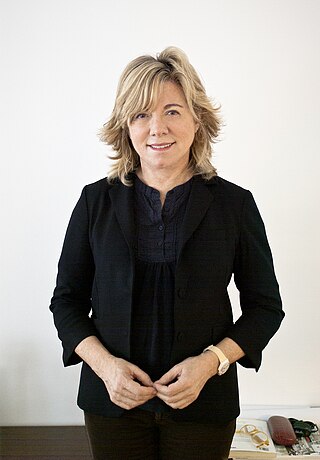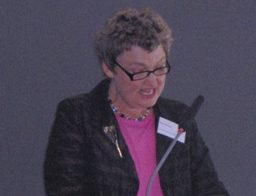
Roskilde is a city 30 km (19 mi) west of Copenhagen on the Danish island of Zealand. With a population of 51,916, the city is a business and educational centre for the region and the 10th largest city in Denmark. It is governed by the administrative council of Roskilde Municipality.
Sal Restivo is a sociologist/anthropologist.

Pilar del Castillo Vera is a Spanish politician who has been serving as a Member of the European Parliament since 2004. She previously served as Minister for Education, Culture and Sport in the government of Prime Minister José María Aznar from 2000 to 2004.
Jaber Fandy "Jay" Gubrium is an American sociologist. He has been a professor in the University of Missouri Department of Sociology since 2002.
Finn Kjærsdam is a Danish Land Surveyor and former rector and professor of Urban Planning at Aalborg University (AAU).
Lars-Henrik Schmidt was a Danish idea-historian and philosopher. Since the early 1980s the pivotal point of his writings has been the development of a specific philosophical perspective termed Social Analytics.
Adrian Carter is an English architect, Associate professor at the Department of Architecture and Design at Aalborg University, Denmark and Director of the Utzon Research Center in Aalborg. Carter also teaches at the Aarhus School of Architecture, Århus, Denmark. Under the auspices of Aalborg University, Adrian Carter initiated and established the Utzon Center and became its first director. The Utzon Center building on the Aalborg harbourfront was designed by Jørn Utzon in conjunction with his architect son Kim Utzon¹s office and opened to the public in May 2008.
Thomas Blom Hansen is a Danish anthropologist and leading contemporary commentator on religious and political violence in India.

Margit Warburg is a Danish sociologist of religion. Since 2004, she has been professor of Sociology of Religion in the Department of Cross-Cultural and Regional Studies at the University of Copenhagen. She was an associate professor at the same university from 1979 to 2004.

The Faculty of Law of the University of Oslo is Norway's oldest law faculty, established in 1811 as one of the four original faculties of The Royal Frederick University. Alongside the law faculties in Copenhagen, Lund and Uppsala, it is one of Scandinavia's leading institutions of legal education and research. The faculty is the highest-ranked institution of legal education in Norway and is responsible for the professional law degree, one of the most competitive programmes at any Norwegian university.
Maxine Baca Zinn, née Baca, is an American sociologist known for her work on gender, race, and ethnicity and particularly, the experience of women of color at the intersection of race, class, and gender.
Anna Leander is a sociologist and political scientist. Leander is currently a professor at the Graduate Institute of International and Development Studies in Geneva. She previously taught at the Copenhagen Business School and the Inst. de Relacoes Internacionais, Pontifical Catholic University of Rio de Janeiro. Leander is well known for her work in critical security studies and international political sociology. Theoretically, Leander has played an important role in bringing the work of Pierre Bourdieu into conversation with the discipline of International Relations, as well as more recently working with materialist and pragmatist sociologies. Empirically, much of her work focuses on the contours of private military contractors, drones, and the politics of knowledge in a digital context. Leander has supported the development of International Political Sociology as an editor, through engagement with professional organizations and research evaluation as well as through her investment with education. Anna Leander was associate editor of International Political Sociology until 2017 and is currently associate editor of Security Dialogue and Contexto Internacional and co-editor of the Routledge Series in Private Security Studies. Leander has served on the Norwegian and Swedish Research Councils, numerous research evaluation boards as well as on the advisory boards of DIIS, the Danish Institute for International Studies and the GIGA German Institute for Global and Regional Studies. She was a co-founder of the International Political Sociology section of the International Studies Association, she co-developed/co-directed the International Business and Politics Program of the Copenhagen Business School, and she has supported/supervised numerous doctoral projects. She is the founder of the University of Copenhagen's Centre for the Resolution of International Conflicts (CRIC).
Jane Menken, née Golubitsky, is an American sociologist and demographer known for her work in sociology in public and international affairs, population studies, social statistics.

Kirsten Brosbøl is a Danish politician. She represented the Social Democrats in the Folketing from 2005 to 2019, and served as Minister for the Environment from 2014 to 2015.
Michael Plekon is an American priest, professor, author, sociologist and theologian. He has published more than a dozen books, as well as hundreds of journal papers, book chapters and reviews on faith and holiness. His works include religious social history, social theory and its connections with theology, the works of Søren Kierkegaard, contemporary Eastern Orthodox theology and theologians of the Russian emigration and saints. More recently, his research and publications explore persons of faith, seeking identity and God in spiritual journeys. He is also writing about persons of faith struggling for social justice and for ways of rediscovering holiness in ordinary life. He is especially interested in the encounter with God in the everyday.

Mary Romero is an American sociologist. She is Professor of Justice Studies and Social Inquiry at Arizona State University, with affiliations in African and African American Studies, Women and Gender Studies, and Asian Pacific American Studies. Before her arrival at ASU in 1995, she taught at University of Oregon, San Francisco State University, and University of Wisconsin-Parkside. Professor Romero holds a bachelor's degree in sociology with a minor in Spanish from Regis College in Denver, Colorado. She holds a PhD in sociology from the University of Colorado. In 2019, she served as the 110th President of the American Sociological Association.
Malene Freudendal-Pedersen is professor of urban planning at Aalborg University and has an interdisciplinary background linking sociology, geography, urban planning and the sociology of technology. Her research has been strongly inspired by the mobilities turn.
Marianne Schroll née Bruun is a Danish specialist in geriatric medicine. As head of the Danish Geriatrics Society from 1986 to 1992, she has played a key role in promoting interest in the ailments of elderly people. Until her retirement in 2007, she was Professor of Geriatrics at the University of Copenhagen and principal specialist in geriatrics at Bispebjerg Hospital. An active participant in international cooperation, she was honoured as an interRAI Fellow in 1991.
Hanne Andersen is a Danish philosopher of science. She is a professor of science education at the University of Copenhagen, head of the Department of Science Education, and a member of the research group on history and philosophy of science and science studies.
Signe Arnfred is a Danish sociologist, feminist and writer who in 1971 became closely involved in Danish feminist activities. A leading figure in the Red Stocking Movement, she organized and participated in meetings and seminars which formed the basis of gender studies in Denmark. In the 1980s. together with her husband she spent four years in Mozambique where she was instrumental in developing a new approach to women in politics. In the late 1980s and early 1990s she was also active in Greenland. Arnfred has published books and articles addressing the place of women in society.





